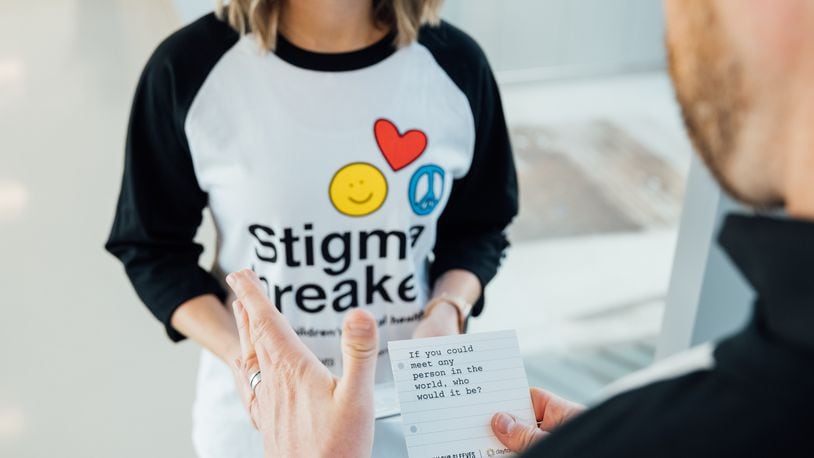The pressures are pushing some children to their breaking point. Dayton Children’s reported a 20% increase of activity at its crisis center between July 2021 and June 2022.
That comes as medical professionals are closely monitoring the number of suicides among students, which increased in Ohio in some age groups in the last decade.
Experts point to consistency and predictability in regular routines as ways to encourage stability among students and urge families to do whatever possible for regular support among adults and peers.
“We’re seeing more kids, and we’re seeing more kids coming in crisis,” Blankenship said.
Death by suicide increasing in children
Suicide in teens and younger adults was already a concern because the COVID-19 pandemic cause disruptions and challenges. Data show those suicides are increasing in many areas in Ohio and nationally.
Suicide is the leading cause of death for children between the ages of 10-14 in Ohio and second-leading cause of death for those 15 to 34, according to the Ohio Department of Health.
Across the country, emergency room visits for suicide attempts in adolescent girls were up 51% from 2019 to 2021.
In a recent survey of students across multiple Ohio counties, about 18-26% of students in Clark and Erie counties said they had thought seriously about wanting to commit suicide.
“The numbers are just really scary,” Blankenship said. “In some areas, that’s about one in four kids.”
From 2011-2020, suicide deaths increased 189% among Ohioans 10 to 14, from nine to 26 deaths. Suicide deaths for Ohioans between the 15 and 19 also peaked in 2018 with 104 but decreased to 64 in 2020.
In Dayton-area counties, the rates of suicide deaths per 100,000 people between 2016 and 2020 ranged from 12.0 in Warren County to 20.1 in Clark County, according to ODH. Montgomery County fell in middle with a rate of 15.3 suicide deaths per 100,000 people.
Consistency, connection is key
One way parents can help is by providing children with a calm environment and a regular schedule.
“Having a schedule is really a key,” Blankenship said.
Health experts have found that children in families that eat dinner together are less likely to have depression and anxiety. Blankenship said the key is having uninterrupted family time together, “a time where the kids are with their parents and they’re able to enjoy each other.”
Additionally, feeling connected with adults and peers can help kids. When children feel supported with a sense of belonging at school, the CDC found they were less likely to report persistent feelings of sadness or hopelessness than those who didn’t. They were less likely to report that they had seriously considered attempting suicide (14% versus 26%), and they were also less likely to have attempted suicide (6% versus 12%).
“The research shows us that one caring adult in every child’s life makes all the difference in how that child can cope and handle life,” said Shannon Cox, superintendent of the Montgomery County Education Service Center.
“There’s not an educator on this planet that doesn’t believe in being that one caring adult for one of their students. But that also can be the custodian. It can be the bus driver, it can be the coach, the athletic coach, it can be the principal, it can be the school counselor.”
Doctors are also encouraging parents to talk to their children when their children are feeling anxious. Dr. Mark Casdorph, a child psychiatrist in the Premier Physician Network, said it’s normal to see stress and anxiety in children, especially as they head back to school. Parents should talk to their children to try to identify if there are some particular issues that are troubling them, he said.
“Go ahead and start that dialogue,” Casdorph said.
Parents can ask, “What are your friends saying about this,” or, “What do you know about that?’”
Casdorph also recommended parents monitor the types of media that children are absorbing and feel comfortable setting limits.
Area providers also expanding to meet these growing needs. Dayton Children’s Hospital is adding a $100 million behavioral health center expected to open in 2025, and the state is funding $25 million of that expansion through American Rescue Plan Act funds.
“It’s going to allow us to almost double our crisis center,” Blankenship said.
Dayton Children’s also has satellite offices, such as in Troy and Beavercreek while it is expanding its presence in Springboro and adding therapy services in Huber Heights. Doctors recommend reaching out to a child’s pediatrician first if a parent or guardian has concerns about their child’s mental and/or behavioral health.
Dayton Children’s also offers support through its On Our Sleeves program, which is a national movement to bring awareness to children’s mental health. It works to break stigma, as well as to connect families and educators to local resources.
Dayton Children’s partners with local school districts to provide school resiliency coordinators. Dayton Public Schools has students work with resiliency coordinators for long-term counseling needs, and the coordinators also involve parents and teachers in the process. For short-term counseling needs, DPS has counselors and student behavioral therapists available.
Help is available
For children in crisis, 988 Suicide & Crisis Lifeline is operational 24/7 with free and confidential support for people in distress. The Crisis Line for Montgomery County Alcohol, Drug and Mental Health Services (ADAMHS) is 833-580-CALL (2255).
Additional crisis lines include:
- Clark County at 937-399-9500
- Warren and Clinton Counties at 1-877-695-6333 (NEED)
- Butler County at 1-844-427-4747 or 1-844-4CRISIS
- Greene County at 937-376-8701
- Darke County, Miami County, Shelby County at 1-800-351-7347
Learn more or find Dayton Children’s mental health resource directory at www.childrensdayton.org/mental-health-resource-directory.
About the Author
